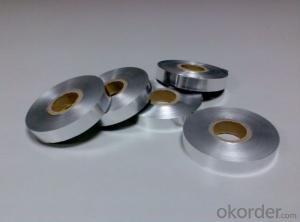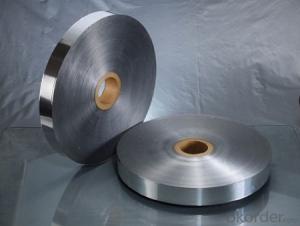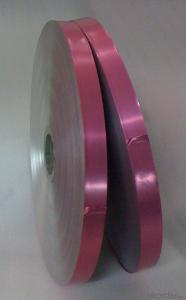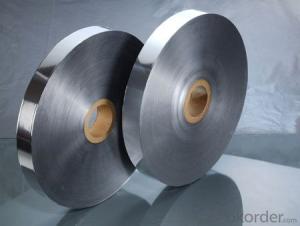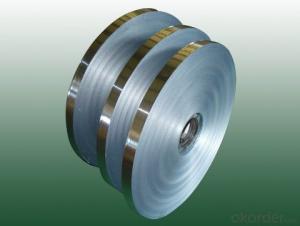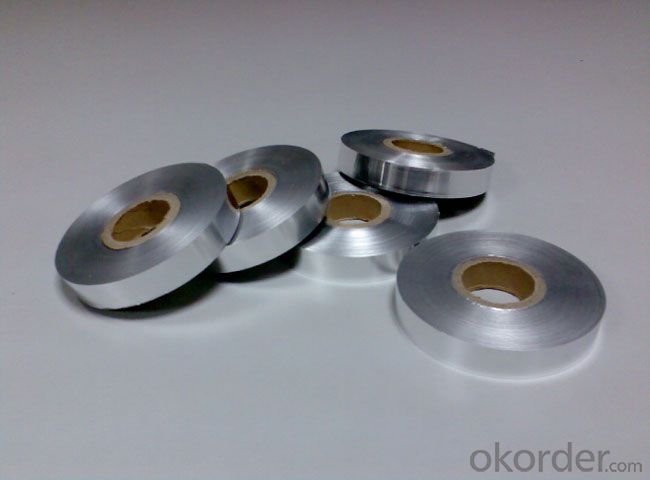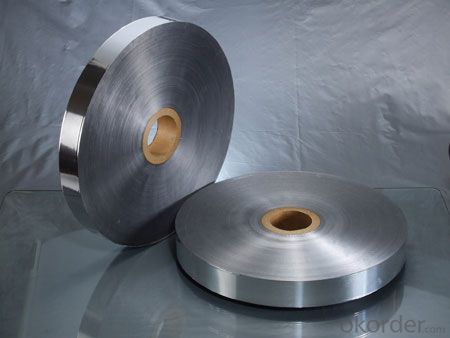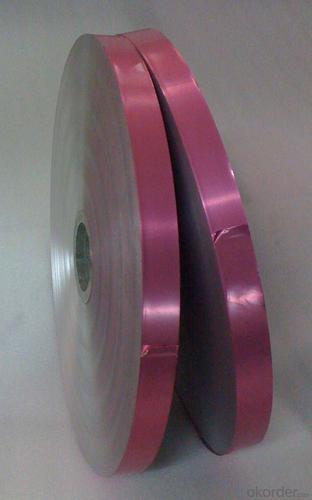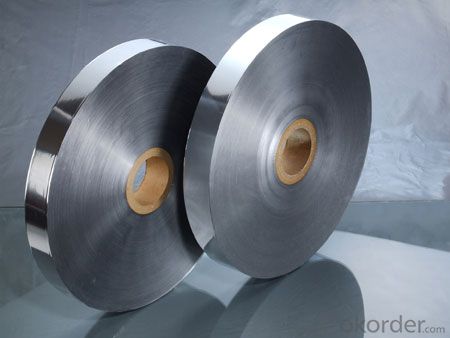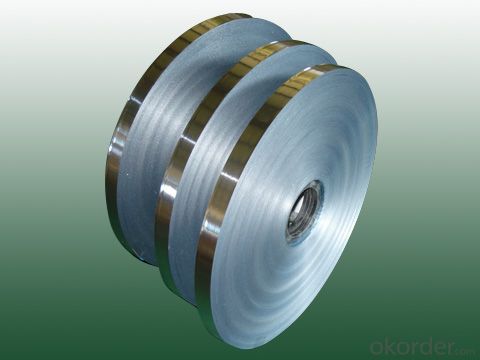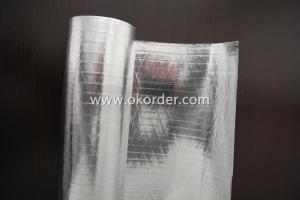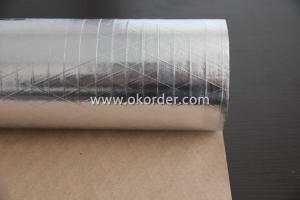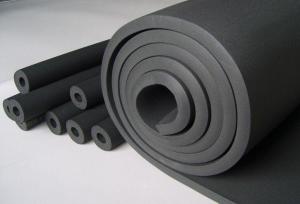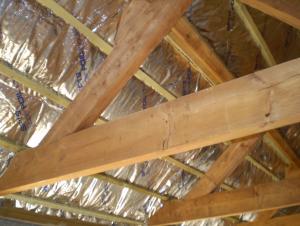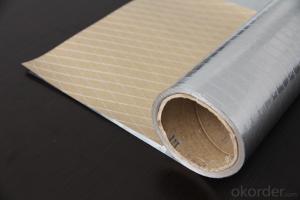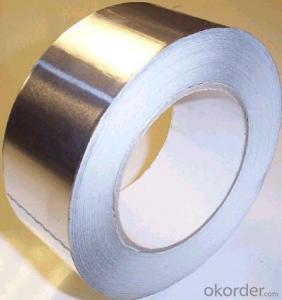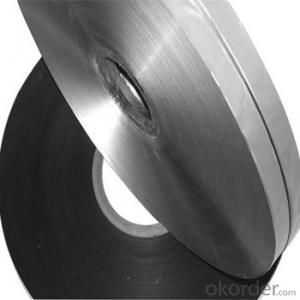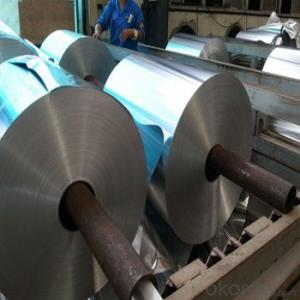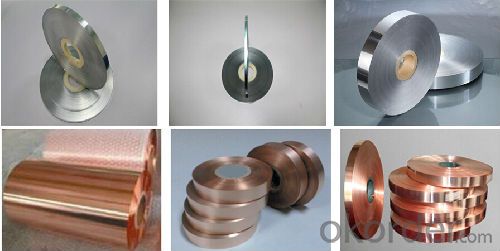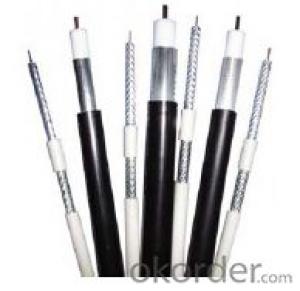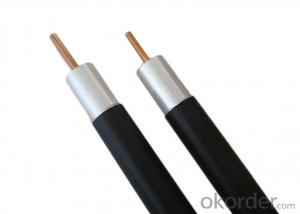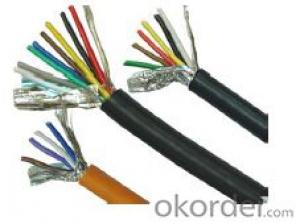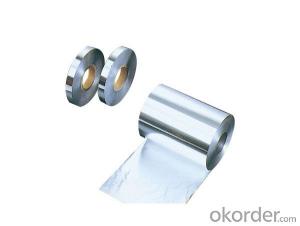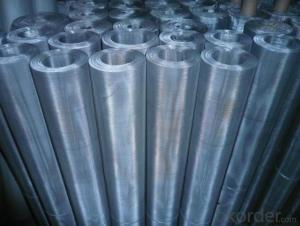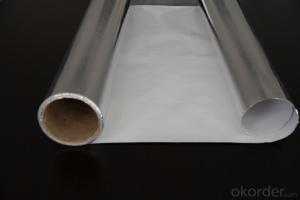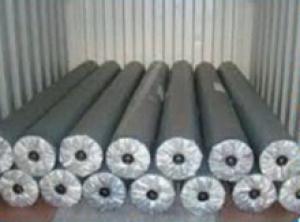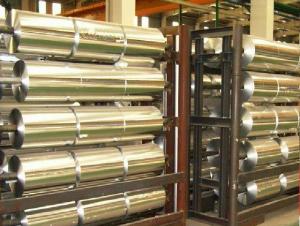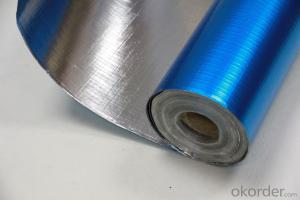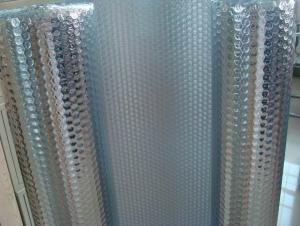Aluminum Foil Facing Copper Foil Shielded Aluminum Foil Cable
- Loading Port:
- Shanghai
- Payment Terms:
- TT or LC
- Min Order Qty:
- 1000 m²
- Supply Capability:
- 1000000 m²/month
OKorder Service Pledge
OKorder Financial Service
You Might Also Like
Aluminum Mylar foil Shielding Foil for Coaxial Cable communication cable
1.Structure of Aluminum Mylar foil Shielding Foil Description:
Electrical cable is used to transfer electricity, information and the realization of electromagnetic energy transformation. The electrical cable in a broad term mainly indicates to cable and in a narrow term indicate insulation material. Its definition is the aggregation of different parts below: one or more insulation cores, the wrapping layers of the cores, the general protective layers and the outer protective layers. Cables also include additive conductor without insulator.
2.Main Features of the Aluminum Mylar foil Shielding Foil:
Aluminum Mylar foil Shielding Foil is applicable to the shielding of coaxial cable, local network wire, electronic communication cable and computer peripheral wire etc.
1.Thickness: min 6.5mic; width: 300-1000mm.
2. According to GB/T 3198-2010.
3.Usages: cable shield, candy wrap
3. Aluminum Mylar foil Shielding Foil Images
4. Aluminum Mylar foil Shielding Foil Specification
AL-PET laminated foil
Description: Apply for overall or individual twisted pair shield for electronic cable and local network cables, protect from external electromagnetic interference. Features option of LUBRITAPE apply to decrease 50% friction of aluminum surface.
Construction: Aluminum foil, Polyester film
CODE | TOTAL THICKNESS | ALU THICKNESS | GLUE | POLYESTER FILM | WEIGHT |
FP007012 | 22±3 | 7 | 3 | 12 | 38.8±5% |
FP010012 | 25±3 | 10 | 3 | 12 | 46.9±5% |
FP020020 | 43±3 | 20 | 3 | 20 | 83.8±5% |
FP025012 | 40±3 | 25 | 3 | 12 | 87.6±5% |
Special specifications are also available, according to customer’s order. | |||||
AL-PET-AL laminated foil
Description: resilient shielding in cable assembling and provide the enhanced shielding required in harsh environments.
Construction: Aluminum foil +Polyester film+ Aluminum foil
CODE | TOTAL THICKNESS | ALU THICKNESS | GLUE | POLYESTER FILM | GLUE | ALU THICKNESS | WEIGHT |
DFP007015 | 35±3 | 7 | 3 | 15 | 3 | 7 | 65±5% |
DFP009020 | 39±4 | 9 | 3 | 15 | 3 | 9 | 76±5% |
DFP015025 | 61±5 | 15 | 3 | 25 | 3 | 15 | 115±5% |
DFP025025 | 80±5 | 25 | 3 | 25 | 3 | 25 | 175±5% |
Special specifications are also available, according to customer’s order. | |||||||
Bonded AL-PET laminated foil
Description: A laminated aluminum-polyester-aluminum tape is fully bonded to the foam dielectric to provide 100% coverage, longitudinally applied over the polyethylene core and the tape minimizes signal leakage.
Construction: Aluminum foil + Polyester film + Aluminum foil + EMAA film
CODE | TOTAL THICKNESS | ALU THICKNESS | GLUE | POLYESTER FILM | GLUE | ALU THICKNESS | GLUE | EMAA | WEIGHT |
DFPH009012 | 65±5 | 9 | 3 | 12 | 3 | 9 | 3 | 25 | 98±5% |
DFPH009020 | 72±5 | 9 | 3 | 20 | 3 | 9 | 3 | 25 | 108±5% |
DFPH009025 | 75±5 | 9 | 3 | 25 | 3 | 9 | 3 | 25 | 114±5% |
DFPH010025 | 84±5 | 10 | 3 | 25 | 3 | 10 | 3 | 25 | 126±5% |
Special specifications are also available, according to customer’s order. | |||||||||
Copper polyester foil
Description: Copper foil, copper lamination foil typically use as shielding for low/medium voltage cable and radio frequency coaxial cable. The rolled annealing copper foil is flexible to wrap cable core, also it has the excellent physical properties, Polyester film provides electrical insulation and high mechanical properties.
Construction: Copper foil + Polyester film
CODE | TOTAL THICKNESS | CU THICKNESS | GLUE | POLYESTER FILM | WEIGHT |
CP018012 | 33±3 | 18 | 3 | 12 | 175±10% |
CP007020 | 46±3 | 18 | 3 | 25 | 195±10% |
CP015012 | 30±3 | 15 | 3 | 12 | 160±10% |
Special specifications are also available, according to customer’s order. | |||||
5.FAQ
We have organized several common questions for our clients,may help you sincerely:
① Where you used this foil?
Aluminum Mylar foil Shielding Foil is used for cable shield, candy wrap for the shielding of coaxial cable, local network wire, electronic communication cable and computer peripheral wire etc.
②How to guarantee the quality of the products?
We have established the international advanced quality management system,every link from raw material to final product we have strict quality test;We resolutely put an end to unqualified products flowing into the market. At the same time, we will provide necessary follow-up service assurance.
③How long can we receive the product after purchase?
In the purchase of product within three working days, We will arrange the factory delivery as soon as possible. The pecific time of receiving is related to the state and position of customers.Commonly 7 to 10 working days can be served.
- Q: Is it safe to use aluminum foil as a wrapping material for food to be fried?
- <p>Yes, you can use aluminum foil to wrap food and fry it. Aluminum foil is heat resistant and can withstand high temperatures, making it suitable for frying. However, it's important to ensure that the foil is securely wrapped around the food to prevent any oil from seeping in and to avoid any foil from breaking off into the oil, which could be a fire hazard. Always follow safety guidelines when deep frying with aluminum foil to prevent accidents.</p>
- Q: Is it safe to use aluminum foil as a facing material for making soups or stews?
- <p>Yes, you can use aluminum foil facing to make soup or stew. Aluminum foil is a common material used in cooking and is safe for contact with food at normal cooking temperatures. It is often used to cover pots to retain heat and moisture, or to create packets for cooking food directly on the heat source. However, it's important to ensure that the foil does not tear or come into direct contact with the heat source, as this could cause it to burn and potentially release aluminum into the food. Always follow safety guidelines and use foil responsibly in cooking.</p>
- Q: Is it possible to use aluminum foil with a reflective side for baking purposes? If yes, what is the method of using it?
- <p>Yes, aluminum foil facing can be used for baking. To use it, place the foil shiny side up on the baking sheet to reflect heat and promote even cooking. It can also be used to cover the food to prevent over-browning or to create a steaming effect, which can help in cooking delicate items. Remember to use it carefully as it can get very hot and can cause burns. Always handle with oven mitts and avoid direct contact with the foil.</p>
- Q: What are the eco-friendly alternatives to traditional plastic food wraps?
- <p>Yes, there are several environmentally friendly alternatives to traditional plastic food wraps. These include beeswax wraps, which are reusable and made from natural materials like cotton, beeswax, and jojoba oil. Another option is silicone food wraps, which are durable, reusable, and can withstand high temperatures. Additionally, there are compostable wraps made from plant-based materials like cornstarch and cellulose, which break down naturally in compost. Using reusable containers or aluminum foil can also reduce the need for single-use wraps. These alternatives help reduce plastic waste and are more sustainable for the environment.</p>
- Q: The user is asking if it's possible to use aluminum foil as a cover for a casserole dish.
- <p>Yes, you can use aluminum foil as a cover for a casserole dish. It's a common practice to cover the dish with foil to prevent the top from drying out during baking or to keep the contents warm. Ensure the foil is food-grade and does not touch the heating elements of the oven. For best results, use heavy-duty aluminum foil to avoid punctures and tearing. Remember to remove the foil during the last few minutes of baking to allow the top to brown if desired.</p>
- Q: What are the most effective ways to clean surfaces that have aluminum foil applied to them?
- <p>The best cleaning methods for aluminum foil facing involve gentle cleaning to avoid damaging the foil. Use a soft cloth or sponge with warm water and mild dish soap to wipe the surface. Avoid abrasive cleaners or scrubbing, as this can scratch or tear the foil. For stubborn stains, a mixture of baking soda and water can be applied as a paste and gently rubbed with a soft cloth. Always rinse thoroughly and dry the surface to prevent water spots and maintain the integrity of the aluminum foil.</p>
- Q: Is it possible to recycle aluminum foil facing multiple times? If yes, what is the process involved?
- <p>Yes, aluminum foil facing can be recycled multiple times. The recycling process involves collecting and sorting aluminum waste, which is then shredded or crushed. The material is melted in a furnace at high temperatures, and the molten aluminum is poured into molds to form new products. This process can be repeated indefinitely without losing the quality of the aluminum, making it one of the most recycled materials globally. The recycling of aluminum saves energy and reduces the environmental impact compared to producing aluminum from raw materials.</p>
- Q: Is it possible to use aluminum foil with a reflective side to create a wrap for outdoor eating purposes?
- <p>Yes, you can use aluminum foil facing to make a wrap for eating outdoors. Aluminum foil is a versatile material that can be used to wrap food for various purposes, including outdoor dining. The reflective side can help keep the food warm or cool, depending on the situation. However, it's important to ensure that the foil does not come into direct contact with the food, especially if it's acidic or high in salt, as this can cause the foil to break down and potentially contaminate the food. Use the foil as a barrier or layer between the food and other surfaces to maintain hygiene and椋熷搧瀹夊叏.</p>
- Q: Is it safe to use aluminum foil facing inside a pressure cooker and does it pose any risks?
- <p>Using aluminum foil facing in a pressure cooker is generally safe and is commonly used to prevent food from sticking to the pot. However, it's important to ensure that the foil does not block the pressure release valve or the vent, as this could lead to a buildup of pressure and potentially cause the cooker to malfunction. Always follow the manufacturer's guidelines for your specific pressure cooker model to avoid any safety issues.</p>
- Q: Explain the differences between thin and thick aluminum foil facing in terms of thickness, durability, and usage.
- <p>Thin aluminum foil facing is characterized by its low thickness, which makes it flexible and easy to handle but less durable. It's commonly used for wrapping food, baking, and protecting surfaces. Thick aluminum foil facing, on the other hand, is more robust and tear-resistant, suitable for heavy-duty applications such as construction, insulation, and packaging. The thicker material offers better protection and durability, but it's less pliable and can be more challenging to work with.</p>
Send your message to us
Aluminum Foil Facing Copper Foil Shielded Aluminum Foil Cable
- Loading Port:
- Shanghai
- Payment Terms:
- TT or LC
- Min Order Qty:
- 1000 m²
- Supply Capability:
- 1000000 m²/month
OKorder Service Pledge
OKorder Financial Service
Similar products
Hot products
Hot Searches
Related keywords
